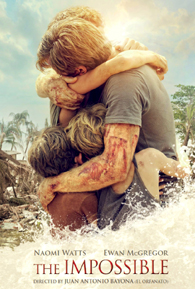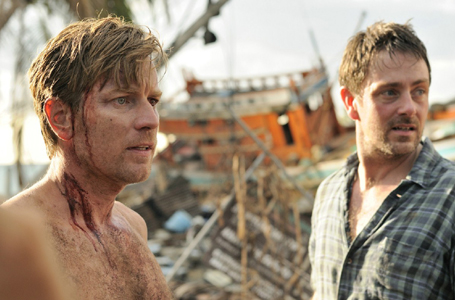
The Impossible is one of the few natural disaster films I have seen in memory that avoids the claptrap of the 'triumph of the human spirit' and gives us in place something far more powerful, intense and bleak. The film assesses that disaster comes unexpectedly and is an equal opportunity taker, and adds an additional twist in having its main heroes/victims be white people of the developed world rather despite its Third World setting, where the Third-World characters are relegated to the background most of the time and are in fact playing the roles of rescuers and saviours. It seems the film is intent on not just subverting the conventions of disaster films, but standing the entire colonial paradigm of "white saviour" stories on their head.
The film takes place during the 2004 Southeast Asian Tsunami and revolves around a family of five vacationing in Phuket. The five are father Henry (Ewan McGregor), mother Maria (Naomi Watts), and children Lucas (Tom Holland), Thomas (Samuel Joslin) and Simon (Oaklee Pendergast). When the Tsunami finally arrives, the five are separated. Maria is stuck with eldest son Lucas, while Henry finds himself with Thomas and Simon. Maria, a doctor and a bit of a hypochondriac, finds herself ironically helpless in this situation as her health begins to deteriorate from serious wounds in her leg and chest. Lucas is a headstrong child who seems to have trouble getting along with his siblings. Henry works for a multinational and is stationed in Japan. By never really articulating what country they are citizens of the movie allows them to form a perfect microcosm of the globally mobile, developed-world upper middle class, who are never particularly rooted anywhere.
This in particular makes the sudden change in direction their lives take after the Tsunami hits even more poignant. The main drama of the film is not in the spectacle of the disaster itself (which rendered terrifically with amazing special effects that don't call attention to themselves makes it a rare exception) but in seeing the comfortable assumptions of upper-middle-class life ripped out from under the protagonists: concerns such as telling your kid not to help himself to the Coke in the Hotel fridge lest you need to pay additional service charges or buckling your seatbelt on a flight as the plane enters turbulence all seem to be futile and insignificant in the face of overwhelming natural calamity. Likewise is also the line between the First World and the Third torched when disaster hits. The Third World (which thankfully is at no point exoticised or demonised in any form throughout the entire film) in the form of villagers, caregivers and medical personnel, are depicted as genuinely professional, caring and capable individuals doing the best they can to help their fellow humans. Meanwhile, especially in the movie's first half, many white characters are often reduced to traits of infantilism and helplessness frequently associated with Third Worlders in similar films, none better expressed than in the sight of the hospital, exploding with largely white patients speaking a melange of tongues, unable to articulate to each other except in basic English. Governments and countries become a distant, far-off abstract concept. The assumptions of a globally mobile life and 'citizenship of the world' are all torched as family and kinship become the only palpable reality.
The Impossible is not a movie about the triumph of the human spirit. Despite our best efforts, it seems to say, nature will always dwarf them by wreaking inescapable losses on us and render all our civilisational attempts at avoiding loss but a futile gesture surrounded by the bubble of our assumptions. The title refers to a scene where an old woman played by Geraldine Chaplin tells one of the younger children about the stars, and how despite how they shine, some of them may long have burned out, so it is impossible to tell the dead stars from the living, even if some stars shine on long after they're gone. I do not know if director J A Bayona and screenwriter Sergio Sanchez framed it as a deliberate reference to Thomas Mann's Buddenbrooks in which he likens the titular family of his novel to a star that shines most brightly on the world when in reality it has long ceased to exist. Given the film ends happily nevertheless for its protagonists, it does push one to wonder especially with the growing sense of failure in the financial and governmental institutions since 2008, if that creepily resonant line is meant to be spoken as an epitaph over industrial civilisation itself.

